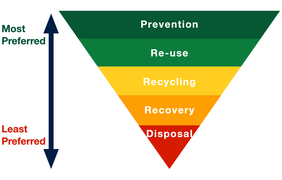The thirteenth Open Research Lecture in the frame of Postgraduate Studies Programme "Sustainable Engineering and Climate Change", will be delivered on Thursday, 4th of May, 2023 at 17:00, Hall K2.A1 and online via zoom (see below).
You are welcome to attend the lecture «New Approaches in Waste Minimization» by Prof. Rainer Stegmann, retired Professor Hamburg University of Technology in Hamburg, Germany.
Join Zoom Meeting:
https://tuc-gr.zoom.us/j/82372239714?pwd=bEd4aUMzZ1hlRmZsNjNPcC9WclNoUT09
Meeting ID: 823 7223 9714
Password: 466740
Abstract
Today we are in Europe in a situation that the scientific community has anticipated for long time. We are short in resources: e.g., in Germany we are lacking of energy, building materials, semiconductors, elements for car construction and many more materials and equipment. This is due to increasing population and standard of living and wasteful use of products which require higher production rates with more resources consumption. In addition, we face economical restrictions, and boycott caused by the terrible war in Europe but also due to diversification of production lines and resources acquisition. Such a system is very vulnerable as we see today.
Due to limited material availability on earth its consumption has to be reduced by avoidance, reuse and effective recycling but also by prohibiting or substituting products and materials. This is the task of the political, social and scientific sectors. In addition, we shall validate our recycling success not only by the amount of recovered and recycled materials and products but by their quality. The main challenge is to foster waste avoidance on a sound scientific basis. These measures contribute also to energy savings and the reduction of climate gases.
Due to physical law a perpetuum mobile does not exist and entropy cannot be avoided, which adds to dispersion of materials and global pollution. A product and material can only be recycled several times depending on the kind of material used and which recycling process used. At the end all used products will become waste either in the gaseous, liquid or solid waste. In this regard official statistics presenting recycling rates need careful consideration.
To avoid distribution of non- recyclables materials and thereby contamination of the environment they have to be concentrated and safely stored in final sinks. Such sinks are safe landfills with several technical barriers and long- term supervision and maintenance. We have always to see the entire production chain.
There is no alternative to minimize resource consumption, it is as actual as ever, we cannot go on like today.


